
to
MISS
SCHERLING'S
RECORDERAMA
WEBSITE
(A website dedicated
to recorders , children and music.)

to
MISS
SCHERLING'S
RECORDERAMA
WEBSITE
(A website dedicated
to recorders , children and music.)
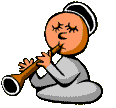
 |

|

 |
![]()
![]()
![]()
![]()
![]()
![]()
![]()
![]()
![]()
INTERESTING
FACTS
YOU
SHOULD
KNOW
ABOUT
THIS AWESOME
INSTRUMENT....
(by the
way, you'll be playing in NO time!)
![]()
![]()
![]()
![]()
![]()
![]()
![]()
![]()
![]()
|
The recorder is an actual instrument that has been around for more than 400 hundred years. |
|
|
This was during the Baroque Period in Music History (1600-1750). The recorder that we play is based on the recorder from this period in time. Some events
that took place during this time, are the birth of opera, the start of
major and minor sounds in music and the development of the modern orchestra.
|
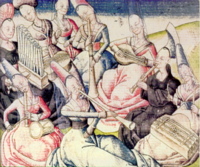 |
|
These plastic instruments were considered the sophisticated flutes of the time, but were made out of wood. By the 1400's, there were eight sizes recorders - great bass, quint bass, bass, tenor, alto, soprano, sopranino. |
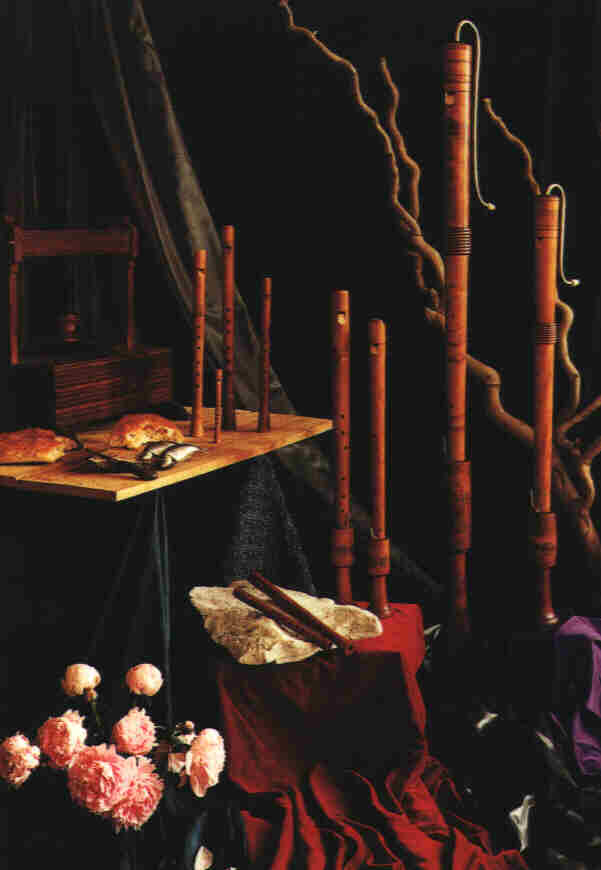 |
|
Recorders are members of
the woodwind family. Like the flute, recorders don't have a reed. |
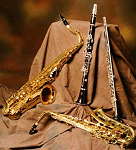 |
|
The recorder has seven finger-holes in front, a thumb-hole behind, and a beak-shaped mouthpiece. |
 |
|
The instrument has been widely revived in the 20th century as an easy instrument for children to learn. |
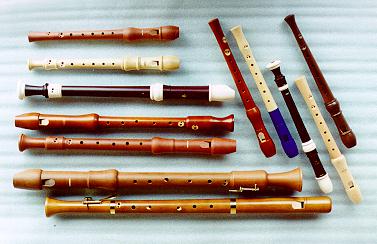 |

THE REASONS
YOUR
MUSIC TEACHER
TEACHES
YOU
TO
PLAY
THE RECORDER.

![]() - Learning how to play the recorder requires
music reading. The language of music can be described as a foreign
language that combines math, science, sounds and symbols.
- Learning how to play the recorder requires
music reading. The language of music can be described as a foreign
language that combines math, science, sounds and symbols.
Click here
to review what you already know.
![]() - Playing any instrument demands a tremendous
amount of coordination. When you play the recorder you will be breathing
with your lungs, reading music with your eyes, playing notes and songs
by moving your fingers, while sitting up straight. WOW!
- Playing any instrument demands a tremendous
amount of coordination. When you play the recorder you will be breathing
with your lungs, reading music with your eyes, playing notes and songs
by moving your fingers, while sitting up straight. WOW!
Click here
to learn more.
![]() - You will learn how to play improvisations
- You will learn how to play improvisations
(music you
just make up and play without
thinking about
it) and compose (write)
your own songs
and pieces.
Click here to print out 3rd Grade composition paper (A).
Click here to print out 3rd Grade composition paper (B).
Click here
to print out 4th Grade composition paper.
![]() - The recorder helps children learn
- The recorder helps children learn
how to play
wind instruments. Wind
instruments
are those instruments that have a
mouthpiece
and require the player to use
air in order
to produce a sound. Once you
know how to
play the recorder, you'll be
able to transfer
what you have learned,
to other instruments.
Click here
to learn more.
![]() - Finally, one of the biggest reasons Miss Scherling
teaches you how to play the recorder is because it's FUN!!!
- Finally, one of the biggest reasons Miss Scherling
teaches you how to play the recorder is because it's FUN!!!
Click here
for more fun.
![]()
![]()
![]()
![]()
![]()
![]()
![]()
![]()
![]()
![]()
![]()
![]()
![]()
![]()
![]()
![]()
![]()
![]()
![]()
![]()
![]()
![]()
![]()
![]()
EXCELLENT
HABITS
FOR PROPER
RECORDER PLAYING.
*Click on the button
to see and hear examples.*
 |
|
|
 |
![]()
![]()
![]()
![]()
![]()
![]()
![]()
![]()
![]()
![]()
![]()
![]()
![]()
![]()
![]()
![]()
![]()
![]()
![]()
![]()
![]()
![]()
![]()
![]()
|
TRY YOUR BEST! That's all that is ever expected of you.
|
 |
A SPECIAL THANKS TO EVERYONE WHO HELPED WITH THIS WEBSITE!
Websites for clip art -
http://www.iband.com/
http://www.clipart.com/
http://www.clipartconnection.com/
Websites about recorders -
http://www.s-hamilton.k12.ia.us/antiqua/r_record.htm
http://members.aol.com/recorder2/
http://www.sfems.org/ebrs/
https://members.tripod.com/~Goddess_Isis/
http://www.saers.com/recorder/dlscores.php
http://ourworld.compuserve.com/homepages/recorder/
http://www.aosa.org/links.html
http://members.iinet.net.au/~nickl/recorder.html
http://members.iinet.net.au/~nickl/sound.html
http://ourworld.compuserve.com/homepages/recorder/RecorderHistory.htm
Websites about instruments -
http://www-atdp.berkeley.edu/9931/htsai/winds.html
http://www.clarkband.org/Instruments.htm
http://www.sheetmusic-uk.co.uk/instruments.htm
http://204.98.1.2/isu/music/recchart1.html
Websites about notation -
http://www.anthro.mnsu.edu/cultural/music/notation.html
http://www.wcboe.k12.md.us/mainfold/technolog/techsat/Barnhart/ppt/recorder/sld001.htm
A VERY SPECIAL ![]() to
Dr. Floyd Richmond, David Richmond, Kris McCaskey and the TI:ME (1B)
class from
to
Dr. Floyd Richmond, David Richmond, Kris McCaskey and the TI:ME (1B)
class from
West Chester University.